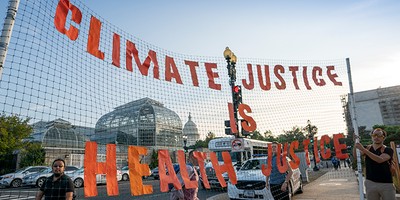For the sake of American security it is critical to understand the consequences of a nuclear Iran, because the current approach of sanctions and diplomacy will ultimately fail in preventing the development of the nuclear weapons Iran sees as its ticket to regional hegemony.
The belief that if Iran obtains nuclear weapons it can be deterred, just as the Soviet Union was deterred during the Cold War, is neither safe nor responsible. The Soviet Union was deterred largely because its finances could no longer support its vast empire in an arms race. Iran however, holds claim to the world’s third largest oil reserves, which in today’s environment provides them considerable economic power.
The more logical comparison of Iran’s potential power would be the former ambitions of Iraq under Saddam Hussein. If Iraq had had the patience to wait to develop nuclear weapons before it invaded Kuwait, the history of the last 20 years in the Persian Gulf would look very different. Confronted with a choice of having Iraq in possession of the Kuwait and Saudi oilfields, versus going to war with a nuclear power – what would the world have chosen?
As Arthur Borden outlined in his excellent recent book A Better Country, the threat Iraq would have posed if armed with nuclear weapons, combined with its aggressive tendencies was the real reason America invaded Iraq. As Borden explains, this has been America’s Middle Eastern policy dating back to President Carter’s 1980 State of the Union address, when he stated: “An attempt by any outside force to gain control of the Persian Gulf region will be regarded as an assault on the vital interests of the United States of America, and such an assault will be repelled by any means necessary, including military force.” A nuclear-armed Iran will eviscerate that policy.
Recommended
Moreover, Iran can derive these benefits without even producing a weapon. All it has to do is get close by enriching enough uranium to produce a bomb, maintaining a warhead development program and securing delivery capability.
Diplomacy cannot halt this gathering threat. Is the U.S., for example, inoculated against a grand bargain in which Iran’s regional dominance is acknowledged in return for non-deployment of nuclear weapons? A concession Iran could achieve without actually possessing an actual bomb. Cheering on the sidelines would be Russia and China eager to diminish United States’ influence in the Middle East and eager as well to either obtain oil for a growing economy as is the case with China or maintain high oil prices which benefit the relatively oil rich Russian economy.
These weapons would also undermine the non-proliferation treaty and the role of the U.N. as an arbiter for stability, a role it has tended to exercise in the breach in any case. By thumbing its nose at the world, Iran can become a regional and arguably a world power capable of advancing its own agenda.
Last, rather than deter an enemy which is the presumption behind evolving State Department logic, the administration will be deterred from actions. It is apparent in the five party talks with North Korea that the U.S. has very little leverage other than acting as a supplicant offering a carrot and yet another carrot to a rogue state with nuclear weapons.
Any way one looks at it, the U.S. would be bargaining from a position of weakness even if the mullahs relying on theological considerations were willing to bargain at all. After all, nuclear weapons represent an insurance policy for the survival of the regime and regional hegemony.
In the case that Iran truly ceased its nuclear weapons program in 2003 as the National Intelligence Estimate report asserts, it probably did not do so because of negotiation, another NIE assertion, but rather because of the American invasion of Iraq in that year. If we triumph in Iraq only to allow Iran to progress towards their goal of regional power unfettered than the entire effort will have been in vain.

























Join the conversation as a VIP Member